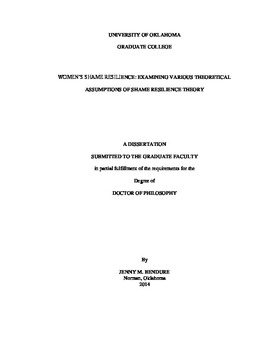| dc.description.abstract | Shame has been identified as a self-conscious emotion (i.e., emotions evoked by self-reflection and self-evaluation) that negatively impacts interpersonal relationships, mental health, and psychological adjustment (Tangney & Dearing, 2002). Shame Resilience Theory (Brown, 2006; SRT) proposes that women can decrease and manage the effects of shame by learning and practicing the four elements of shame resilience: acknowledging personal vulnerability to shame, critical awareness, reaching out, and speaking shame. SRT emerged from a grounded theory study; however, to date, there have been no quantitative research studies to examine the theoretical assumptions of SRT. Thus, the purpose of this study was to examine the theoretical relationships among shame and three elements of shame resilience: critical awareness, self-compassion, and reaching out. A fourth predictor was added to control for troubling family experiences, which have been shown to contribute to shame levels in adulthood (Gilbert, 2003). Results of a hierarchical multiple regression analysis indicated that critical awareness, self-compassion, and reaching out explained 39% of the variance in shame scores beyond that predicted by income, education, and number of troubling family experiences. Critical awareness and self-compassion, but not reaching out, were significant individual predictors of shame scores. Findings provide empirical support for various theoretical assumptions of SRT and encourage the fostering of critical awareness and self-compassion in the treatment of shame and shame-related disorders. | en_US |
